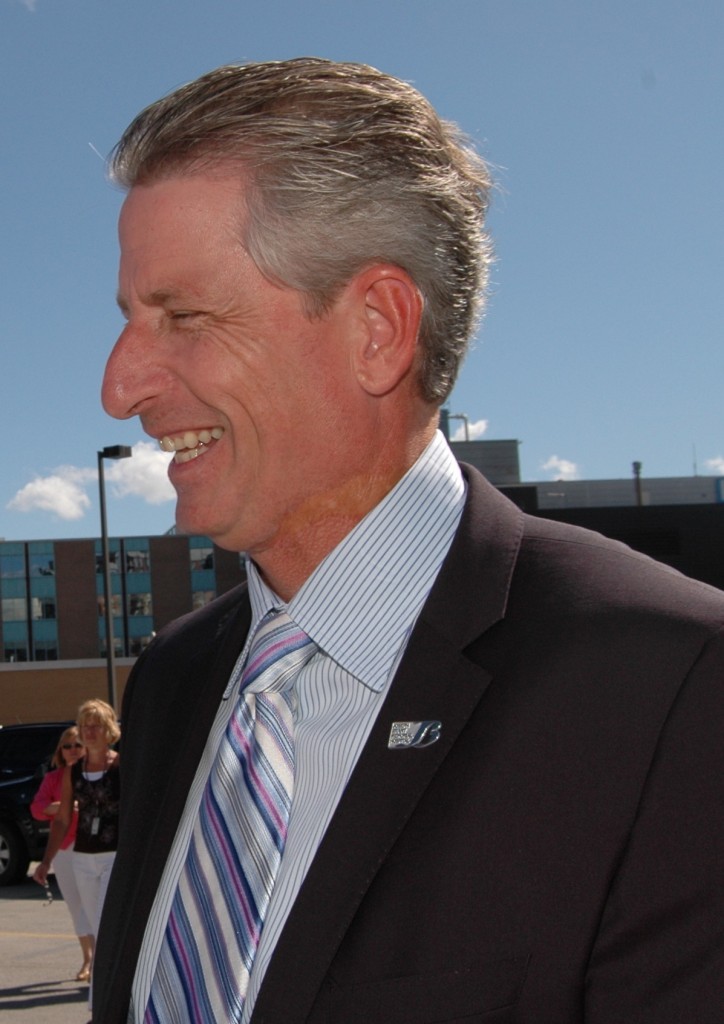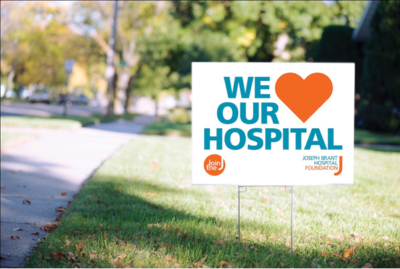 By Pepper Parr
By Pepper Parr
August 6th, 2020
BURLINGTON, ON
Hospitals – vital and expensive.
Burlington has had an, at times, awkward relationship to the Joseph Brant Hospital.
It took a long time to get the provincial funding for the upgrade of the older parts of the building and the construction of the new wing.
Former Mayor Rick Goldring got a bit of a shock when he was told by the province that the city was going to have to come up with a large part of the construction cost.

A special tax levy was required to pay for the city’s portion of the hospital – which taxpayers willingly paid.
The amount was so big that the city had to impose a special tax levy to raise the funds – and the public willingly paid that additional tax levy.
The city then found a way to roll that tax levy over into a source of funds for other needed service. The public wasn’t as happy with that little tax trick.
One would have thought the city council at the time would have at least asked – truth be told they really didn’t even come out and tell the taxpayers what they were doing – they just did it.
The Gazette was also the news source that dug out many of the facts relating to the c-dificile tragedy at the hospital that resulted in the deaths of at least 80 people.
Yesterday we published a piece on the experience of two people at different area hospitals: The Joseph Brant, where a woman had an appointment and how she was treated. Then in the same piece, about a male who had an appointment at the St. Joseph’s Hospital in Hamilton.
Two very different experiences.
We expect a strong reaction to that article and be accused of picking on the Joseph Brant Hospital. What we were doing was pointing out the different cultural base from which each hospital works.
St. Joseph’s was formed by the Sisters of St. Joseph: nuns who brought a different touch to patient needs.
Burlington’s Joseph Brant doesn’t have that deep historical cultural commitment that is needed. That culture can be grown – the leadership at the hospital has to show by example how patient care can be done differently.

Joseph Brant Memorial Hospital CEO Eric Vandewall.
The Joseph Brant has done some very fine medicine. Eric Vandewall ensured that the renovation and new build was done close to perfect.

It was a high end field hospital that went up very quickly – hasn’t been used – yet.
He made the brave decision to spend $2 million on a facility that could be used for any over flow of COVID-19 patients.
The space has not had to be used – yet.
Some will suggest that was $2 million wasted. It wasn’t wasted. Vandewall did what he believed was a prudent decision and we don’t think he was wrong.

Telling us how they feel about their hospital.
Burlington has thousands of people who willingly put up a sign on their lawn declaring how much they love their hospital. Nothing wrong with solid civic pride.
What we would like to see is the evolution of a different culture that has people experiencing the care and concern that one person experienced at St. Joseph’s in Hamilton and not the experience a woman had at Joseph Brant.
It can be done but it won’t be done until someone at a very senior level makes the change a personal mission.
Related news stories:
The cute tax trick with the hospital tax levy.
Two different patient experiences
















I’m tired of the perpetual fundraising. Jo Brant need to focus on the priority… patient care.
I have had two serious family emergencies at Joseph Brant and both times the treatment received was disgraceful and dangerous and in my view, negligent – particularly the treatment of my father, who died. That his final days were as bad as they were will forever haunt me. I practically burst into tears every time I see a We ♥️ Our Hospital sign. I’d like less advertising, less fundraising and more accountability and care. Reading Blair’s story below is another in a long line of bad JB stories of which I am aware, but is by far one of the worst, and that Vandewall still never cared enough to follow up or respond to messages, it seems not much has changed.
Really Pepper!!
You are wishing a cultural change based on the perceived single interaction of an individual with a Hospital Staff/Volunteer during Covid.
Stating that “we would like to see is the evolution of a different culture that has people experiencing the care and concern that one person experienced at St. Joseph’s” is ludicrous.
Over the years, I have had different privileges at numerous hospitals, MUMC, SJH (Hamilton), GGH, SJH (Guelph), Henderson, Oakville and JBH. The dedication, empathy, congeniality is no different between any of these facilities in regards to the healthcare professionals, staff, volunteers, orderlies, ward clerks, custodians, etc. The vast majority are outstanding, a very few may have issues like any Canadian.
Medicine encompasses tremendous joys and soul wretching tragedies especially during this Covid crisis. The level of stress has never been higher and the courage of the all Front Line workers is impressive. You would learn a great deal if you talked to these individuals and walked in their foot steps. Listen to the Ward Clerk who works till 11pm and then goes home, changes her work clothes outside of her house, sleeps and wakes to feed her children breakfast & lunch. Schools them, cares for them and leaves them in her signifiant other’s care when they arrive home from their shift work so she can go back to the Hospital and perhaps put her life in jeopardy.
Finally, insinuating that the Catholic Religion is the underlying sole factor for the SJH heavenly interaction has very little to do with the current Canadian Hospital demographics. Every Religious and non-Religious affiliation make up the core of Canadian Society and thus Hospitals. It is the individual, not their Religious denomination, that matters to the growth of a society.
gfraser
A colleague of mine once said “you know, everyone in the City has a Jo Brant story” and she was right. Several of them, I’m sure, are positive. It’s just the law of averages that it be so. However, mine are almost uniformly bad. All centre on my wife who has had a history of chronic and quite serious illness. In June of 2014 we went to the Jo Brant Emergency when she was suddenly unable to either walk or urinate. Through a combination of incompetence, indifference and, in my opinion, ageism they missed serious spinal compression that resulted in over 20 hours of back surgery over the next 15 months, a permanent super pubic catheter and an almost complete loss of mobility. The reaction of the Chief of Staff at the time, after an investigation was conducted, was philosophic – “we’re treating it as a learning experience”. Indeed, worthwhile to note that in 2014 the Jo Brant had much to learn. It was dead last of all Ontario Hospitals in the four measurements used by the Canadian Institute for Health Information (CIHI) to evaluate the effectiveness and efficiency of emergency departments. Unfortunately, it has not improved substantially since. There have been several other serious missteps involving my wife since this initial and irrevocable failure of care – each reinforcing the fact that the basic orientation and culture within the hospital has not materially improved.
Part of the problem is, of course, systemic. In other words, the situation at the Jo Brant is a ‘worst case’ product of a health care system that is seriously flawed; that is hospital rather than patient centric; that drives patient support requirements onto ill-prepared and ill-resourced families as an economic coping measure; that is a collage of disconnected institutional fiefdoms; that uses an ill-prepared and over-worked general practitioner as the access point to more specialized and critically scarce resources; and that has failed to produce a viable patient electronic health record despite over 20 years of effort and billions of dollars of expenditure. By contrast, New Brunswick has had one since 1985. When a patient and their family are in crisis is not the time to repeatedly require medical and medication histories or be completely unable to locate the patient file. But, in my experience, this happens repeatedly at the Jo Brant where critical protocols often appear to be improvised and/or inconsistently applied.
Broad political and infrastructure failures aside, a large part of the problem is certainly both local and specific. it is the result of where and how we have chosen to focus our efforts and priorities. So, the Jo Brant Board of Directors hired a CEO known for his fund-raising prowess because the community was faced with a need to raise the capital necessary for hospital expansion. And, as noted in the article, Mr. Vandewall has done a remarkable job in finding the dollars and the donors. He was a man for his time but has that time now passed? It is difficult to believe that a man who never once asked after my wife’s condition or performed any follow up after the time limit for lawsuit had passed, is the right person to transform the culture of care at the hospital. Indeed, neither Mr. Vandewall nor any representative ever responded to emails that were sent directly to his hospital account. It was finished business with no continuing financial liability; case closed with no purpose in learning the impact his hospital had had on one family. It is no surprise that he has failed to turn a last-ranked emergency department into a first level care facility? Does he understand the operational needs of both staff and practitioners and provide his full support to both? Do all within the walls of the hospital understand their mission as expressed and embodied by their leader? Does he ‘walk his talk’ and have empathy for those he serves? Perhaps, it is time for a new CEO – one who can help introduce a true patient-centric culture. Arguably, we now have the tools and the facility for our health care practitioners to tend to the needs of the community. Do they have the service culture needed to effectively and compassionately use them?